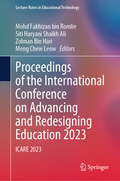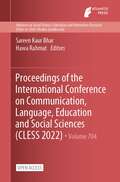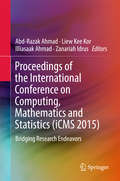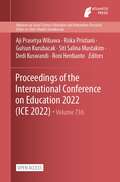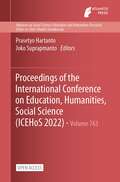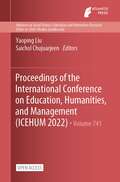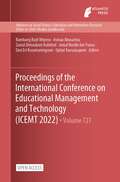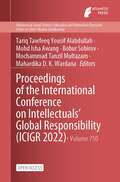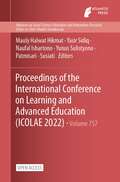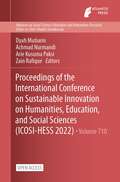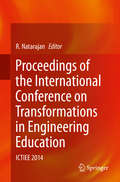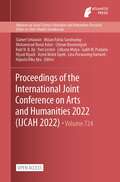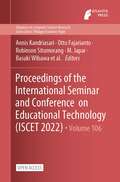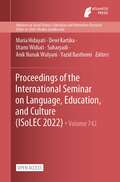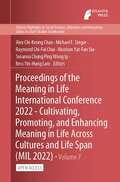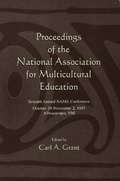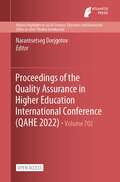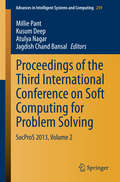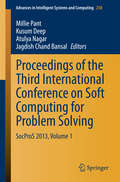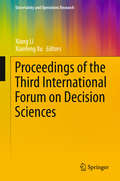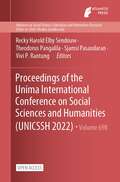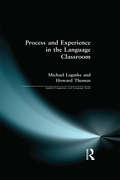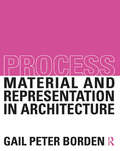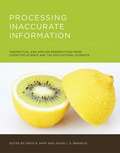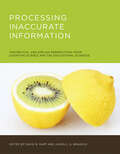- Table View
- List View
Proceedings of the International Conference on Advancing and Redesigning Education 2023: ICARE 2023 (Lecture Notes in Educational Technology)
by Mohd Fakhizan bin Romlie Siti Haryani Shaikh Ali Zolman Bin Hari Meng Chew LeowThis book is a compilation of conference papers presented at the International Conference on Advancing and Redesigning Education 2023 (ICARE’23). It covers four main topics, including: Technology Enhanced Leaning, Innovative Curriculum and Program Offering, Learning Beyond Classroom, and Digital Campus. This book presents the recent innovations and the authors' practical experiences in teaching and learning, and helps educational practitioners to enhance their teaching and learning.
Proceedings of the International Conference on Communication, Language, Education and Social Sciences (Advances in Social Science, Education and Humanities Research #704)
by Sareen Kaur Bhar Hawa RahmatThis is an open access book.The 3rd International Conference on Communication, Language, Education and Social Sciences (CLESS 2022) will be held on 25-27 July 2022. This year’s conference will be a part of the bigger Digital Future Congress (DIFCON) comprising of various other conferences in different fields and will be held online. CLESS 2022 is unique in which it combines communication, language, education, and social science in an international academic conference. The aim of CLESS 2022 is to offer a platform for both local and international academics, educators, researchers and other professionals to meet, share and discuss latest research, trends, ideas and innovation in the field of communication, language, education, psychology and social sciences. The conference is aimed to provide a platform for young researchers as well as to support and encourage other researchers to present their research, to network within the international community of researchers and to share and seek the insight and advice of successful senior researchers all over the world during the conference.
Proceedings of the International Conference on Computing, Mathematics and Statistics (iCMS #2015)
by Abd-Razak Ahmad Liew Kee Kor Illiasaak Ahmad Zanariah IdrusThis proceedings volume consists of refereed papers presented at the Second International Conference on Computing, Mathematics and Statistics (iCMS 2015) held in Langkawi, Malaysia in November 2015. Divided into three sections - Computer Science, Mathematics and Statistics - the book includes both quantitative and qualitative research that confronts current societal issues. Within the main sections, the book also covers education based research works and the applications of computer and mathematical sciences in social science, business, industries and the life and hard sciences. Drawing on the theme Bridging Research Endeavor on Computing, Mathematics and Statistics, each of the conference papers are carefully selected and edited to cater to readers from diverse applied and social sciences backgrounds. The book allows for the contemplation and reflection on the possibility of the knowledge growth and knowledge sharing in building a better world for future generations.
Proceedings of the International Conference on Education 2022 (Advances in Social Science, Education and Humanities Research #736)
by Aji Prasetya Wibawa Riska Pristiani Gulsun Kurubacak Siti Salina Mustakim Dedi Kuswandi Roni HerdiantoThis is an open access book. This conference proceeding constitutes a selection of the best papers from the International Conference on Education 2022, ICE 2022, held in Malang, Indonesia, in October 2022. This conference proceeding is a collection of research findings and viewpoints relating to education and any subject associated to the present trend of education. This trend is lead by the set of improvements and changes in the instructional, societal, and technological structures and processes towards the endeavor of accomplishing the goals. The conference proceeding also extends to compile the papers discussing the issues in relation to emerging technologies for educational context such as ethical issues, security and privacy, quality control, accreditation and sustainability issues, and cultural issues.
Proceedings of the International Conference on Education, Humanities, Social Science (Advances in Social Science, Education and Humanities Research #763)
by Prasetyo Hartanto Joko SuprapmantoThis is an open access book. The International Conference on Education, Humanities, and Social Science (ICEHoS) is an activity in the form of an international conference by presenting new studies and research results in the fields of Education, Humanities, and Social Sciences. The Elementary School Teacher Education Study Program is the organizer of this international conference. ICEHoS is the second conference held by us and will be held virtually due to the COVID-19 Pandemic which has not shown a better situation.The 2nd ICEHoS 2022 conference is expected to be able to bring together national and international scale researchers, academics, practitioners, students, and community and industry activists in our chosen fields. Considering the COVID-19 pandemic which has impacted various lines, especially research in this field, the 2nd ICEHoS 2022 international conference has the main theme, “The future education in society 5.0 to build a strong learning connection.”
Proceedings of the International Conference on Education, Humanities, and Management (Advances in Social Science, Education and Humanities Research #741)
by Yaoping Liu Saichol ChujuarjeenThis is an open access book. This event is co-organized by the Institute of Science Innovation and Culture (ISIC) and Research and Development Institute (RDI), Rajamangala University of Technology Krungthep, Thailand. This year’s ICEHUM 2022 was held online and onsite on 26 November 2022. The theme of this conference is “Leading and Being Sustainable in the COVID-19 New Normal“. This conference aspires to bring to light new standards, models, and reference guides that will help humanity rise above the challenges of COVID-19, leading men and women to embrace the new normal, no longer uncertain but living a sustainable existence.
Proceedings of the International Conference on Educational Management and Technology (Advances in Social Science, Education and Humanities Research #727)
by Bambang Budi Wiyono Asmaa Abusamra Zainal Dimaukom Kulidtod Jamal Nordin bin Yunus Desi Eri Kusumaningrum Ophat KaosaiyapornThis is an open access book. The International Conference on Educational Technology and Management (ICEMT) is held to bring together academics, researchers, teachers, educational entrepreneurs, practitioners, and policy makers. They are responsible for implementing educational technology by leveraging resources through education management to create and enable ecosystem capabilities and access to education. The Covid-19 pandemic teaches that aspects of information and communication technology in education management are full of limitations. Inevitably, educational users have moved dramatically to online channels. Students and teachers are accustomed to learning from home. There are opportunities, as well as challenges. Although the pandemic isn’t over yet, future updates are needed.
Proceedings of the International Conference on Intellectuals’ Global Responsibility (Advances in Social Science, Education and Humanities Research #750)
by Bobur Sobirov Mochammad Tanzil Multazam Tariq Tawfeeq Yousif Alabdullah Mohd Isha Awang Mahardika D. K. WardanaThis is an open access book. The Covid-19 pandemic has become a global issue have a great impact in almost all fields including in the economic, social, political, cultural and education, and has created social pressures community economy. Almost all over the country having trouble. However, this has consequences for declining economic growth has had an impact on social life, including in countries in ASEAN and especially in Indonesia. We are only at the beginning of the most challenging part, which is how we will emerge out of this situation and return to a “new normal. These challenges highlight the importance of science, technology, and innovation as the decisive factors in any scenario of emergence from the crisis and economic recovery.To eliminate Covid-19 and find solutions to its effects are endeavored through research in various fields of sciences. Hopefully, the cure can be found and the new situation can be adapted.
Proceedings of the International Conference on Learning and Advanced Education (Advances in Social Science, Education and Humanities Research #757)
by Naufal Ishartono Yasir Sidiq Mauly Halwat Hikmat Yunus Sulistyono Patmisari SusiatiThis is an open access book. The COVID-19 pandemic in the last two years has influenced how educational system works. Online learning became the primal policy taken by all institutions in the world to lower the risk of the virus spread. Despite the drawbacks of the online learning, teachers and students were accustomed with the distant learning through web meetings, Learning Management Systems (LMS) and other online learning platforms. In that time, topics under digital learning and education 5.0 were the main stakes in academic disseminations. This year some institutions start to conduct their teaching and learning process classically as before the pandemic, others are still continuing online and not few are in hybrid. This leaves a question: what learning reform should be made in post-pandemic era?This conference invites researchers, experts, teachers and students to discuss the coping solutions of the question. It is important for them to contribute to the understanding of re-imaging online education for better futures, innovative learning design, new skills for living and working in new times, global challenge of education, learning and teaching with blended learning, flipped learning, integrating life skills for students in the curriculum, developing educators for the future distance learning, humanities learning in the digital era, assessment and measurement in education, challenges and transformations in education, technology in teaching and learning, new learning and teaching models. Not limited to these, scholars may add another interesting topic related to learning reform in post-pandemic era to present.
Proceedings of the International Conference on Sustainable Innovation on Humanities, Education, and Social Sciences (Advances in Social Science, Education and Humanities Research #710)
by Dyah Mutiarin Achmad Nurmandi Arie Kusuma Paksi Zain RafiqueThis is an open access book.This proceeding consists of research presented in ICOSI UMY, on 20-21 July 2022 at Universitas Muhammadiyah Yogyakarta. The conference covers the topic of governance, international relations, law, education, humanities, and social sciences. The COVID-19 pandemic first time that occurred in 2019, has brought many changes that constrain all countries to adapt quickly. The crisis has shown vulnerabilities and gaps in several primary systems, including healthcare, social protection, education, value chains, production networks, financial markets, and the ecosystem.One of the efforts that each country can take to rise from the COVID-19 pandemic is through strengthening multilateralism, international solidarity, and global partnerships. Hence, this conference raises the central theme “Strengthening Global Partnership for Resilience.” This theme covers sub-themes that allow prospective scholars to submit their papers for ‘Virtual Conferences’ presentation under the following scopes: Social Sciences, Humanities, Educations, and Religious Studies. Presented papers will also get a chance to be published in our remarkable partner publishers. Through the International Symposium on Social, Humanities, Education, and Religious Studies (ISSHERS) and Asian Conference on Comparative Laws (Asian-COL), we hope that participants will express their innovative and creative ideas to provide benefits and contribute knowledge to strengthen global partnerships among countries.Finally, all 75 papers published in this proceedings are expected not only as research output but can be developed further into prototypes or evidence for policy making.
Proceedings of the International Conference on Transformations in Engineering Education
by R. NatarajanThis book comprises the proceedings of the International Conference on Transformations in Engineering Education conducted jointly by BVB College of Engineering & Technology, Hubli, India and Indo US Collaboration for Engineering Education (IUCEE). This event is done in collaboration with International Federation of Engineering Education Societies (IFEES), American Society for Engineering Education (ASEE) and Global Engineering Deans' Council (GEDC). The conference is about showcasing the transformational practices in Engineering Education space.
Proceedings of the International Joint Conference on Arts and Humanities 2022 (Advances in Social Science, Education and Humanities Research #724)
by Azmil Mohd Tayeb Wulan Patria Saroinsong Lina Purwaning Hartanti Slamet Setiawan Muhammad Nurul Ashar Chinun Boonrongrut Rojil N. B. Aji Yuni Lestari Lillyana Mulya Galih W. Pradana Riyadi Riyadi Hujuala Rika AyuThis is an open access book. This joint conference features four international conferences: International Conference on Education Innovation (ICEI), International Conference on Cultural Studies and Applied Linguistics (ICCSAL), International Conference on Research and Academic Community Services (ICRACOS), and International Conference of Social Science and Law (ICSSL).It encourages dissemination of ideas in arts and humanities and provides a forum for intellectuals from all over the world to discuss and present their research findings on the research areas. This conference was held in Surabaya, East Java, Indonesia on September 10, 2022 – September 11, 2022.We are inviting academics, researchers, and practitioners to submit research-based papers or theoretical papers that address any topics within the broad areas of Arts and Humanities.
Proceedings of the International Seminar and Conference on Educational Technology (Advances in Computer Science Research #106)
by Cher Ping Lim Rekha Koul Annis Kandriasari Otto Fajarianto Robinson Situmorang M. Japar Basuki Wibawa Zoraini Wati Abas Eliza B. Ayo R. Benny Agus Pribadi Rudi SusilanaThis is an open access book. The ISCET: “International Seminar and Conference on Educational Technology” is an annual agenda organized by the Doctoral Program in Educational Technology, Universitas Negeri Jakarta, Indonesia. Our Topics and Scopes include: Utilization and Development of Learning Resources, Technology usage in Education, Blended Learning Technology, Information Technology and Computing in Education, Artificial Intelligence in Education Machine Learning, Computer Vision in Education, Big Data and Data Mining in Education, Information System and IT Operation in Education, Software Engineering in Education, Computer Network and Security in Education, and Mobile Computing in Education. We invite academics and practitioners to participate and be presenters (call for paper) in this event.
Proceedings of the International Seminar on Language, Education, and Culture (Advances in Social Science, Education and Humanities Research #742)
by Yazid Basthomi Maria Hidayati Dewi Kartika Utami Widiati Suharyadi Anik Nunuk WulyaniThis is an open access book.Hosted by Faculty of Letters, Universitas Negeri Malang, it is an annual International Seminar on Language, Education, and Culture held to gather researchers, practitioners, teachers, and students to identify and share various aspects in language, education, and culture.Theme: Embracing Changes and Innovations in Language, Education, Art, and Culture in Post-Pandemic LifeSubthemes: Changes and Innovations in Language, Education, and CultureChanges and Innovations in Literature and ArtOnline Teaching and Learning PracticesCorpus-Based Language, Teaching and ResearchLanguage in MediaGender and IdentityPop, Contemporary and Digital CultureCulture and SpiritualityMultilingualism and TranslanguagingVisual and Performing ArtsOral Tradition & Local CultureDigital Literacy and Information Science
Proceedings of the Meaning in Life International Conference 2022 - Cultivating, Promoting, and Enhancing Meaning in Life Across Cultures and Life Span (Atlantis Highlights in Social Sciences, Education and Humanities #704)
by Michael F. Steger Alex Chi-Keung Chan Raymond Chi-Fai Chui Nicolson Yat-Fan Siu Susanna Chung Ping Wong Ip Bess Yin-Hung LamThis is an open access book. Meaning in Life (MIL) International Conference 2022, “Cultivating, Promoting, and Enhancing Meaning in Life Across Cultures and Life Span” will be held 0n 22-25 June 2022, Onsite & Live Online, at The Hong Kong Shue Yan University, Hong Kong, China.The concept of meaning in life (MIL) has recently earned a renaissance of interest. Although MIL has always been framed as significant for human survival, it has simultaneously been portrayed as chronically lacking in people’s lives. Furthermore, though MIL has been seen as a universal need, it is also highly idiosyncratic. These paradoxes of MIL being a basic necessity but also a rare commodity, and as being universal yet idiosyncratic, have driven the quest for meaning throughout history and across disciplines. The COVID-19 pandemic has not only been changing and impacting the ways we live, but also initiates us to quest more about what still makes life meaningful in this chaotic, challenging, and uncertain world? The increasing quest for MIL provides the driver for meaning-enhancing interventions and meaning-centered practices, but the efficacy of these interventions is influenced by cultural and developmental moderators. Thus, the MIL International Conference 2022 will focus on the theme of cultivating, promoting, and enhancing meaning in life across cultures and life span, and welcomes paper presentations that share and discuss empirical-based and evidence-based MIL research, practice, and applications.
Proceedings of the National Association for Multicultural Education: Seventh Annual Name Conference
by Carl A. GrantThe National Association for Multicultural Education (NAME) held its 7th Annual Conference in 1997 with a theme of Daring to Educate for Equity and Excellence: A Multicultural and Bilingual Mandate for the 21st Century. The conference generated scholarship in the form of keynote speeches and conference papers and stimulating discussions among the membership. The conference's southwest location of Albuquerque, New Mexico provided an excellent back drop to discuss the interconnections between multicultural education and bilingual education, as well as provide an opportunity for proponents of both of these important ideas to engage in useful and important discussions. The essays comprised in this book capture much of the written record of the conference. They convey ideas, beliefs, and research findings that were presented at the formal sessions at the conference. Just as with NAME's previous proceedings, it is expected that these proceedings will become not only a written record of the conference but a "live curriculum" to help pre/K through college educators to prepare themselves and those they teach for the 21st century.
Proceedings of the Quality Assurance in Higher Education International Conference (Atlantis Highlights in Social Sciences, Education and Humanities #702)
by Narantsetseg DorjgotovThis is an open access book. The Mongolian National University of Education has successfully organized the "Quality Assurance in higher education" International Conference for 16 consecutive years since 2016. The scope of this conference grows year to year, increasing in quality and participants. Furthermore, in 2018, the conference website was launched (www.qahe.msue.edu.mn) and started partnering with sponsor organizations. A total of 33 papers will be discussed at the plenary and three sessions of this conference named "Education Quality Policy and Implementation," "Innovation of Teaching and Learning Technology and Contemporary Trends," and "Teaching and Learning Technology Implementations and Outcomes." There are five poster presentations. The research volume on high education quality and its relevant disciplines has increased. We hope that the conference will contribute experiences and knowledge about policymaking and research worldwide.
Proceedings of the Third International Conference on Soft Computing for Problem Solving
by Millie Pant Kusum Deep Jagdish Chand Bansal Atulya NagarThe proceedings of SocProS 2013 serve as an academic bonanza for scientists and researchers working in the field of Soft Computing. This book contains theoretical as well as practical aspects of Soft Computing, an umbrella term for techniques like fuzzy logic, neural networks and evolutionary algorithms, swarm intelligence algorithms etc. This book will be beneficial for the young as well as experienced researchers dealing with complex and intricate real world problems for which finding a solution by traditional methods is very difficult. The different areas covered in the proceedings are: Image Processing, Cryptanalysis, Supply Chain Management, Newly Proposed Nature Inspired Algorithms, Optimization, Problems related to Medical and Health Care, Networking etc.
Proceedings of the Third International Conference on Soft Computing for Problem Solving
by Millie Pant Kusum Deep Jagdish Chand Bansal Atulya NagarThe proceedings of SocProS 2013 serve as an academic bonanza for scientists and researchers working in the field of Soft Computing. This book contains theoretical as well as practical aspects of Soft Computing, an umbrella term for techniques like fuzzy logic, neural networks and evolutionary algorithms, swarm intelligence algorithms etc. This book will be beneficial for the young as well as experienced researchers dealing with complex and intricate real world problems for which finding a solution by traditional methods is very difficult. The different areas covered in the proceedings are: Image Processing, Cryptanalysis, Supply Chain Management, Newly Proposed Nature Inspired Algorithms, Optimization, Problems related to Medical and Health Care, Networking etc.
Proceedings of the Third International Forum on Decision Sciences
by Xiang Li Xiaofeng XuThese conference proceedings focus on the topic of decision-making under uncertainty, smart decisions, management simulation and their applications in operations management for power and logistics companies. The Beijing University of Chemical Technology organized IFDS2015, the 3rd International Forum on Decision Sciences, with this year's theme being "Decision Making under Uncertainty". The proceedings collect 7 selected papers presenting the cutting-edge modeling and solution methods and including numerous practical case studies, which are of interest for researchers and practitioners alike. Teachers, students and practitioners working in the fields of decision science, operations research, management science and engineering will benefit from the valuable findings presented in this book.
Proceedings of the Unima International Conference on Social Sciences and Humanities (Advances in Social Science, Education and Humanities Research #698)
by Recky Harold Elby Sendouw Theodorus Pangalila Sjamsi Pasandaran Vivi P. RantungThis is an open access book. The Unima International Conference on Social Sciences and Humanity (UNICSSH) 2022 was conducted on October, 11th – 13th 2022, at The Grand Kawanua International City, Manado, North Sulawesi, Indonesia.In 2022, Universitas Negeri Manado will host the Indonesian National Education Convention (KONASPI) X. Konaspi is a routine activity of the PPTKN which is held once every four years. The fourth industrial revolution (4.0) is marked by technological advances and supported by artificial intelligence that creates opportunities and challenges for the education system. University and vocational school graduates are facing a world transformed by technology which in turn is transforming the workplace from task-based to human-centered characteristics. Certain skills such as critical thinking, emotional intelligence, problem-solving, cognitive flexibility, and knowledge production are required. To answer this demand, the education system must put revolutionary innovation on its agenda. Scholars, researchers, and practitioners are invited to share ideas, research results, and best practices about education, science, and technology now and in the future at an international conference held by Universitas Negeri Manado as part of the Indonesian National Education Convention (KONASPI). As part of KONASPI X activities, Universitas Negeri Manado is holding the 2022 International Conference on Education, Social Science, and Humanities (ICESSHum). The topics in this international conference are Education, Law, Politics and Social Sciences, Economics, Public Administration, and Humanities. Through these themes, it is expected to involve many professionals who have indirect roles in related fields. To enrich this event, the committee invites all national and international participants (including academics, researchers, professionals, and other relevant stakeholders) to send research papers or review papers to be presented at the conference.
Process and Experience in the Language Classroom (Applied Linguistics and Language Study)
by Howard Thomas Christopher N. Candlin Michael LegutkeProcess and Experience in the Language Classroom argues the case for communicative language teaching as an experiential and task driven learning process. The authors raise important questions regarding the theoretical discussion of communicative competence and current classroom practice. They propose ways in which Communicative Language Teaching should develop within an educational model of theory and practice, incorporating traditions of experimental and practical learning and illustrated from a wide range of international sources. Building on a critical review of recent language teaching principles and practice, they provide selection criteria for classroom activities based on a typology of communicative tasks drawn from classroom experience. The authors also discuss practical attempts to utilise project tasks both as a means of realising task based language learning and of redefining the roles of teacher and learner within a jointly constructed curriculum.
Process: Material and Representation in Architecture
by Gail Peter BordenThis book examines the interrelationship of representational methods and material systems as fundamental drivers of the design process. Identifying four primary categories of representational logics - point, line, surface, mass - each category is illustrated through four precedent projects that deploy iterative material sensibilities. As a collection, this text provides a comprehensive categorization of the architectural design process. Through the comprehensive definition of categorical typologies, it illustrates the collective capability of this conceptual methodology. By unpacking projects through their specific design devices, the collective analysis reveals the impact of material techniques and methods of representation as a generative tool. Broad in scope, it identifies and uniformly analyses some of the most significant projects from the last century, including: UK Pavilion Shanghai - Heatherwick Studio, Shanghai,China Gatehouse - Office dA, Beijing, China Maison Colonial - Jean Prouve, France/Africa de Young Museum - Herzog and de Meuron, California USA Montreal Expo 67 - Buckminster Fuller, Montreal, Canada Jean Marie Tjibou Cultural Center – RPBW, Noumea, Indonesia House III - Peter Eisenman, New York, USA Barcelona Pavilion - Mies van der Rohe, Barcelona, Spain Tel Aviv - Scott Cohen, Tel Aviv, Israel Los Manantiales - Felix Candella, Mexico City, Mexico Yokahama Terminal – FOA, Yokahama, Japan Pantheon, Rome, Italy Tres Grand Bibliotheque - Rem Koolhaas, OMA, Paris, France Brother Claus Field Chapel - Peter Zumthor, Switzerland Embryonic House- Greg Lynn Richly illustrated with consistent, clear and precise line drawings, the book presents a series of iconic precedents through a unique analytical and graphic sensibility.
Processing Inaccurate Information
by Jason L.G. Braasch David N. RappOur lives revolve around the acquisition of information. Sometimes the information we acquire -- from other people, from books, or from the media -- is wrong. Studies show that people rely on such misinformation, sometimes even when they are aware that the information is inaccurate or invalid. And yet investigations of learning and knowledge acquisition largely ignore encounters with this sort of problematic material. This volume fills the gap, offering theoretical and empirical perspectives on the processing of misinformation and its consequences.The contributors, from cognitive science and education science, provide analyses that represent a variety of methodologies, theoretical orientations, and fields of expertise. The chapters describe the behavioral consequences of relying on misinformation and outline possible remediations; discuss the cognitive activities that underlie encounters with inaccuracies, investigating why reliance occurs so readily; present theoretical and philosophical considerations of the nature of inaccuracies; and offer formal, empirically driven frameworks that detail when and how inaccuracies will lead to comprehension difficulties.ContributorsPeter Afflerbach, Patricia A. Alexander, Jessica J. Andrews, Peter Baggetta, Jason L. G. Braasch, Ivar Bråten, M. Anne Britt, Rainer Bromme, Luke A. Buckland, Clark A. Chinn, Byeong-Young Cho, Sidney K. D'Mello, Andrea A. diSessa, Ullrich K. H. Ecker, Arthur C. Graesser, Douglas J. Hacker, Brenda Hannon, Xiangen Hu, Maj-Britt Isberner, Koto Ishiwa, Matthew E. Jacovina, Panayiota Kendeou, Jong-Yun Kim, Stephan Lewandowsky, Elizabeth J. Marsh, Ruth Mayo, Keith K. Millis, Edward J. O'Brien, Herre van Oostendorp, José Otero, David N. Rapp, Tobias Richter, Ronald W. Rinehart, Yaacov Schul, Colleen M. Seifert, Marc Stadtler, Brent Steffens, Helge I. Strømsø, Briony Swire, Sharda Umanath
Processing Inaccurate Information: Theoretical and Applied Perspectives from Cognitive Science and the Educational Sciences (The\mit Press Ser.)
by Jason L.G. Braasch David N. RappInterdisciplinary approaches to identifying, understanding, and remediating people's reliance on inaccurate information that they should know to be wrong.Our lives revolve around the acquisition of information. Sometimes the information we acquire—from other people, from books, or from the media—is wrong. Studies show that people rely on such misinformation, sometimes even when they are aware that the information is inaccurate or invalid. And yet investigations of learning and knowledge acquisition largely ignore encounters with this sort of problematic material. This volume fills the gap, offering theoretical and empirical perspectives on the processing of misinformation and its consequences.The contributors, from cognitive science and education science, provide analyses that represent a variety of methodologies, theoretical orientations, and fields of expertise. The chapters describe the behavioral consequences of relying on misinformation and outline possible remediations; discuss the cognitive activities that underlie encounters with inaccuracies, investigating why reliance occurs so readily; present theoretical and philosophical considerations of the nature of inaccuracies; and offer formal, empirically driven frameworks that detail when and how inaccuracies will lead to comprehension difficulties.ContributorsPeter Afflerbach, Patricia A. Alexander, Jessica J. Andrews, Peter Baggetta, Jason L. G. Braasch, Ivar Bråten, M. Anne Britt, Rainer Bromme, Luke A. Buckland, Clark A. Chinn, Byeong-Young Cho, Sidney K. D'Mello, Andrea A. diSessa, Ullrich K. H. Ecker, Arthur C. Graesser, Douglas J. Hacker, Brenda Hannon, Xiangen Hu, Maj-Britt Isberner, Koto Ishiwa, Matthew E. Jacovina, Panayiota Kendeou, Jong-Yun Kim, Stephan Lewandowsky, Elizabeth J. Marsh, Ruth Mayo, Keith K. Millis, Edward J. O'Brien, Herre van Oostendorp, José Otero, David N. Rapp, Tobias Richter, Ronald W. Rinehart, Yaacov Schul, Colleen M. Seifert, Marc Stadtler, Brent Steffens, Helge I. Strømsø, Briony Swire, Sharda Umanath
